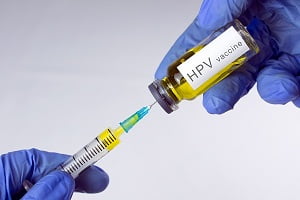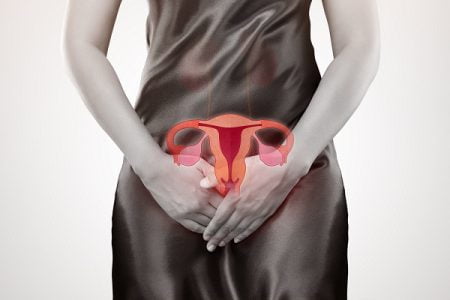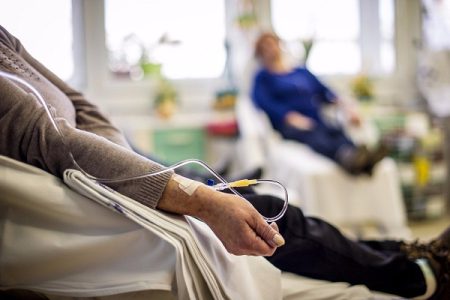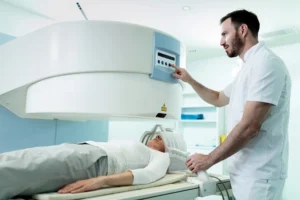Human Papillomavirus (HPV) Vaccination for Prevention of Cervical Cancer in Women
- Updated on: Jul 12, 2024
- 4 min Read
- Published on Apr 19, 2021

What are human papillomaviruses (HPV)?
Human papillomaviruses (HPVs) are a group of about 200 related viruses. About 40 types of them can easily spread through direct sexual contact, from the skin and mucous membranes of the infected people. They can be spread by vaginal, anal, and oral sex.
Other HPV types are responsible for other diseases and conditions such as non-genital warts.
Which cancers are caused by HPV?
HPVs can cause several types of cancer, such as:
- Cervical cancer
- Anal cancer
- Cancers of the anus and back of the throat: including the base of the tongue and tonsils
- Other rare cancers such as vaginal cancer, vulvar cancer, penile cancers etc
More: Early Detection, Prevention, and Screening of Cervical Cancer
HPV vaccination for cervical cancer: What types of HPV does the vaccine protect against
Cervical cancer is mainly caused by Human Papillomavirus infection. It is one of the leading cancer types in women around the world and the second most common cancer in women worldwide. There are several methods of prevention of cervical cancer, but prevention by vaccination (HPV shot) is emerging as the most effective option.
Cervical cancer vaccines: What HPV vaccines are available to prevent cervical cancer?
Three HPV vaccines are approved by the FDA to prevent HPV infection. These are:
- Gardasil
- Gardasil 9
- Cervarix
All of these HPV vaccine types can prevent infections with HPV types 16 and 18, two high-risk HPVs that cause most of the cervical cancers and some of the other HPV-associated cancers.
Gardasil can also prevent infection with HPV types which cause most of the genital warts. Gardasil 9 too prevents infection with several high-risk HPV types.
HPV Vaccine Gardasil and its benefits
It helps prevent infection by HPV-16, HPV-18, and also HPV-6 and HPV-11, the two HPV types that cause 90% of the genital warts. Gurdasil is used to prevent cancers and pre-cancers of the cervix, vulva, vagina, anus, penis, and throat.
HPV Vaccine Gardasil 9 and its benefits
Gardasil 9 can protect against nine HPV types which cause about 90% of all cervical cancer cases in women, 95% of all HPV-related cancers in men, and 90% of genital warts.
Gardasil 9 shot provides vaccinated people with protection against these nine types of HPVs:
- types 16 and 18 – they cause the majority of HPV-related cancers
- types 31, 33, 45, 52 and 58 – common HPV types associated with cervical cancer
- types 6 and 11, which cause 90% of genital warts
Does the HPV vaccine prevent HPV that causes cervical cancer? How effective is the HPV vaccine?
The HPV vaccine targets the HPV types that most commonly cause cervical cancer and some other cancers as listed above. It also protects against the HPV types that cause most genital warts.
Protection from HPV vaccine is expected to be long-lasting. But none of the currently available HPV vaccines protect against all HPV infections that cause cancer. It is therefore important for any women even after HPV vaccination to continue with cervical cancer screening at regular time intervals as recommended by the doctor.
HPV vaccine age limit: Who should get the HPV vaccines?
HPV vaccine for women
The FDA has approved Gardasil and Gardasil 9 for use in females of age between 9 and 26 for the prevention of HPV-associated cervical, vulvar, vaginal, and anal cancers and pre-cancers thereof, and genital warts.
Cervarix is approved by the FDA for use in females of an age between 9 and 25 years for the prevention of HPV-caused cervical cancer.
HPV vaccine for men
Gardasil and Gardasil 9 are also approved by FDA for use in males for the prevention of HPV-related anal cancer, pre-cancers, and genital warts.
HPV vaccine for boys and girls (kids) age
Boys and girls should start getting the HPV vaccine series at an age of 11 or 12 years. The HPV vaccine series can be started as early as age 9 and should be finished before boys turn 13 years old.
If you haven’t already got your preteen or teen boys vaccinated, it’s not too late. If the boy is already 15 years old and hasn’t started the HPV vaccine series, he will need three shots, over 6 months.
More: Cervical Biopsy: Types, Procedure, Risks, and Recovery
Human papillomavirus vaccine schedule, timing, and doses: Cervical cancer vaccine schedule
The schedule for HPV vaccine under immunization program for cervical cancer and other risks currently is:
- first dose in year 8 at school
- second dose at least six months after the first dose
If a girl misses any of the two doses of HPV vaccinations at school, she should contact the school immunisation team or her parents. Preferably, it should be done as early as possible.
Older girls, as old as 18 years old, should talk to their doctor about how to get vaccinated and the schedule for their doses.
Are there any adults who should avoid the HPV vaccine? Can pregnant and breastfeeding women take HPV vaccines?
These people should not get the HPV vaccine:
- people who had a life-threatening allergic reaction to a previously taken dose of the HPV vaccine
- pregnant women
- someone who had an allergic reaction to an ingredient contained in the HPV vaccine
- anyone with other severe illnesses
The HPV vaccine is not proved to be harmful to pregnant women or their unborn babies. However, pregnant women are advised not to receive the HPV vaccine due to lack of conclusive support. Women who are breastfeeding are recommended to safely receive the HPV vaccine.
HPV injection site: How is the HPV vaccine given? Where is the HPV shot injected?
The human papillomavirus shot is given as an injection into the upper arm – usually two doses are needed, with at least six months gap.
According to CDC recommendations, HPV vaccines should be given intramuscularly in the deltoid region of the upper arm or in the higher anterolateral area of the thigh.
Preferably, the injection should be given in the deltoid region of the upper arm as it is considered as the preferred site for administration of the HPV vaccine to prevent cervical cancer and other risks. It should not be administered intravenously, intra-dermally, or subcutaneously.












